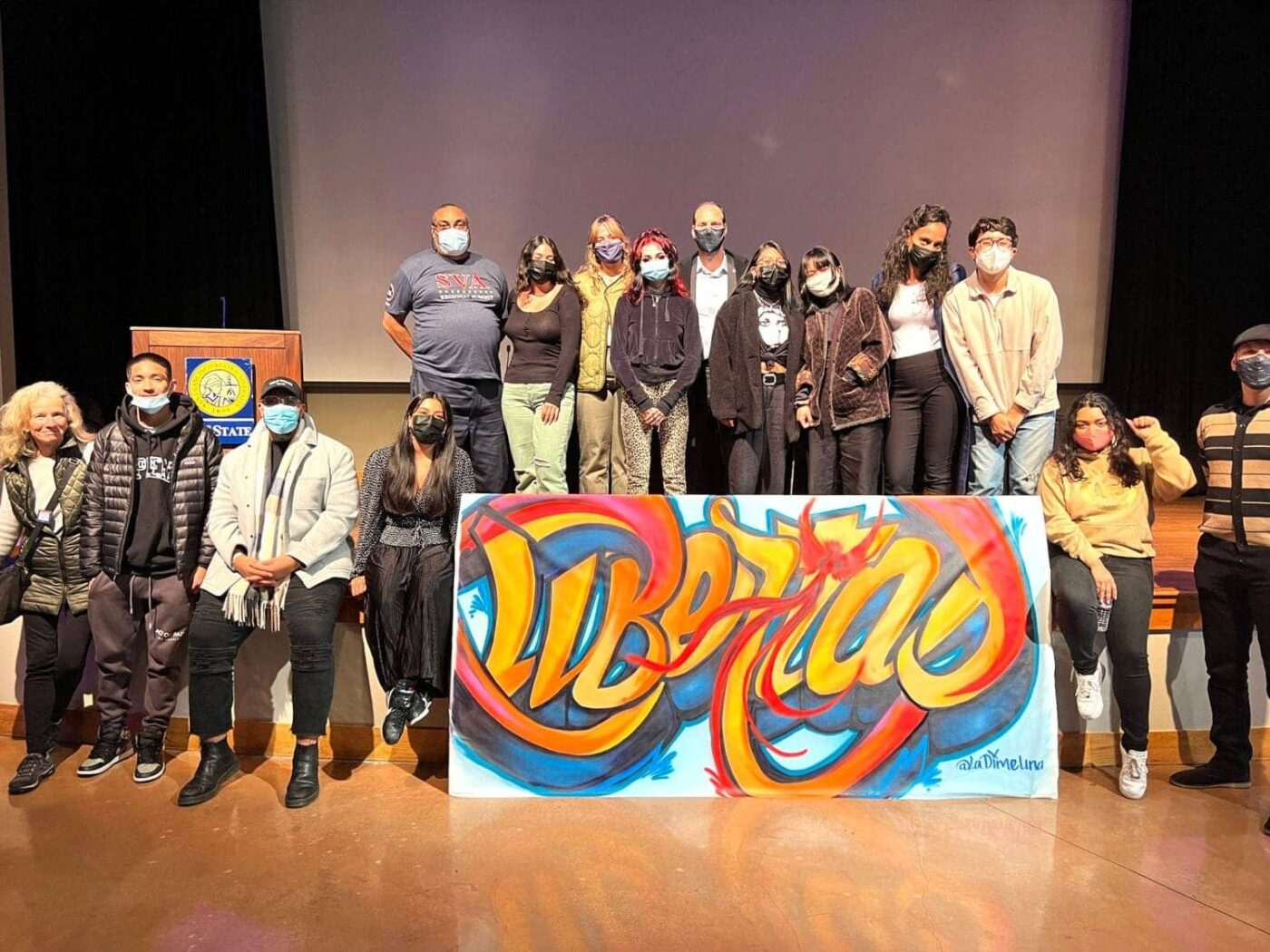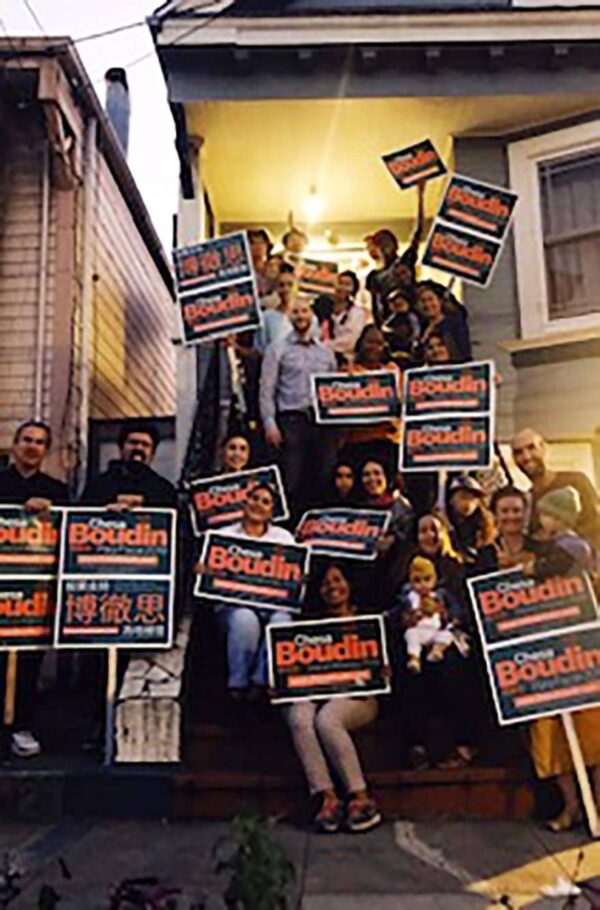
by students of the SFSU College of Ethnic Studies
As students and members of the first college of Ethnic Studies in this country, founded through struggle and student demands in the 1960s, we are the next generation of liberation-minded scholars dedicated to the radical imaginations of our political, social and economic institutions.
We know first-hand the effects of systematic racism, the prison industrial complex and the ways it affects our communities – and we are dedicated to confronting it. We were also instrumental in getting DA Chesa Boudin in office in 2019, and we are committed to keeping him in office. We are dedicated to his vision of criminal and restorative justice, and the overall end to mass incarceration.
As the next generation of agents of social and racial change, we understand mass incarceration only keeps us from liberation. The mass criminalization and punishment of our communities have never kept us safe. The constant policing and surveillance has increased our anxiety, fear and existence, especially as Black or Brown people navigating our society.
According to the Sentencing Project, seven states maintain a Black-white disparity in incarceration larger than 9 to 1, including California, Connecticut, Iowa, Maine, Minnesota, New Jersey and Wisconsin. This reality seeps in even more when you look at one of the most “progressive” cities in the entire country.
Between 2005 and 2014, 43 percent of all arrests by the San Francisco Police Department were of Black people, even though Black people make up only 5 percent of San Francisco’s current population.
The police terror San Franciscans face has led to continuous incarceration, jeopardizing the growth of communities of color due to more police violence and punishment. If we hope to reimagine safety for all people, we must invest in alternatives to move away from harm towards justice, healing and restorative practices.
One of the steps to abolishing mass incarceration is abolishing the school-to-prison pipeline. Black and Brown children of school age are ushered into the justice system because law enforcement members disproportionately target them as suspects of criminal behavior, then inflict severe punishment for misdemeanors.
Currently, millions of kids attend a school where police officers are present on campus and can arrest students for crimes. Discipline of children has been rising as suspensions, expulsions and on-campus arrests increase. An introduction to the justice system so young has a lasting impression on kids, giving them a distaste for law enforcement and experience in being treated as a criminal.
Many of the targeted kids are minorities or are facing circumstances where they need help, not imprisonment. Focusing on harm reduction, such as preventing these police interactions with youth, can save children from entering the legal system straight out of school and set them up for higher success.
SF District Attorney Chesa Boudin has been working to end the school-to-prison pipeline by launching programs, such as the primary care diversion program to prevent incarceration from impacting children and their families, and has pledged to not prosecute children as adults. It is imperative to end the school-to-prison pipeline if mass incarceration is ever to be abolished and our justice system is ever to be reformed.
The community of San Francisco in 2019 challenged itself – and challenged the whole country – by electing Chesa Boudin. The City of San Francisco issued a challenge to every district attorney’s office, declaring that the seat of the DA was going to be claimed – reclaimed – by the people.
In this historic time of social and infrastructural uncertainties, the community of San Francisco demonstrated that it could dream into office a new commitment to the people; a commitment to changing an elected position that has historically been a source of violence, racism and bigotry against the most vulnerable communities of our city.
San Francisco realized that, in the midst of uprisings, rebellions and social and political upheavals, it needed someone who could speak to the hearts and the political futurism of young people. San Francisco demonstrated a commitment to re-evaluating the failed policies of the past by putting Chesa Boudin in office.
The most heartbreaking of phenomena, though, is that those who are really sincere in their commitment to the people, as they work with and bask in the proximity to power, eventually change.
Thousands of young people who needed help, who needed jobs, who needed education, who needed the competent care and social services of their loved ones were being erased out of their communities like they were insects and rodents, incompatible with the dreams and economic imaginations of San Francisco.
The office of the district attorney was a powerful force in the erasing and invisibilizing of at risk youth and folks who committed petty crimes. The office of the district attorney perpetuated narratives about Black and Brown communities, narratives that protect and defend the gangsters and murderers in blue.
The office of the district attorney protected and served the interests of criminality by the system. But here comes Chesa Boudin – young, white and with progressive charm, he captures the heart and spirit of San Francisco. He has been a uniting force for San Francisco, with a combination of ideals, zeal and a proven practice of service to the community. Over the last two years, he has delivered.
How many times must he repeat the statistics? At some point, either you believe the facts or you speak the truth about why you are really seeking to recall him.
Chesa Boudin is challenging law enforcement institutions from within. Chesa is challenging the entirety of the criminal justice system – from the judges to prosecutors, from police officers to police unions.

Chesa Boudin is challenging the very theory, foundation and practices of public safety in San Francisco in a way the status quo deems unacceptable for a person holding the position of DA. Chesa’s recall is the criminal justice system, as it exists, retaliating against his audacity and bold interrogation of its functionality.
How dare he? Historically and presently, we have seen progressive voices run for office and win by calling upon the voices of downtrodden, the pitiful and the miserable, suffering in the slums of this country. As they hopped from fundraiser to rally to luncheon, they claimed at every opportunity they had on the microphone, holding the baby or planting the tree, that they would never betray the people, that they would represent and speak for them and make power respect them.
From mayoral to congressional seats, this model of seeking the voting power of the marginalized has been a strategy as old and sickening as this country’s routine betrayal of vulnerable communities at home and abroad.
The most heartbreaking of phenomena, though, is that those who are really sincere in their commitment to the people, as they work with and bask in the proximity to power, eventually change. One political concession after the other; one political strategy after the other; one lesser-of-two-evils decision after the next.
It is not the system that changes, but them. This, too, is a strategy of the state, as if to prove to vulnerable communities that whoever you elect to save you can’t save you – because it is not America that is problematic, it is you, with your color and culture, your laziness and incompetence. The list of violent and racist narratives can go on and on.
Here is the point behind this long loop of thoughts: Chesa has not changed. Chesa, over the last two years, has not played political games. He has not been willing to play political concessions for a recall’s sake, or even at the risk of his reputation and future political ambitions.
Chesa has continued to be sincere, honest and committed to the dreams, imaginations and commitments made to the people and the platforms they trusted he would enact by serving as San Francisco’s district attorney.
This recall is not just an attack on Chesa, but on students across San Francisco, the marginalized voices across San Francisco, the working class people of San Francisco, the at-risk communities of San Francisco and on the progressive heart of San Francisco – which mobilized by the thousands to put faith in Chesa Boudin.
Chesa Boudin is changing San Francisco’s criminal justice process from within. Chesa Boudin is challenging and threatening every district attorney’s office and law enforcement agency in this country.
“Chesa Boudin must be recalled” is the narrative of those who seek the criminal justice status quo of over policing, over incarcerating and the othering of people. Chesa has not sold the community out, and we must not cave to the pressure and turn against one of our own at this moment.
Efforts to recall Chesa Boudin have been put forth by conservative republicans and those purporting to be “moderate” democrats. Their preferred solution is one that has failed again and again while causing great pain to vulnerable communities.
Under their approach, Black and Brown people in San Francisco are heavily surveilled and criminalized; the “criminals” they fear are poor people in need of food, housing and health care.
This will not make any of us safer. And it will continue the harm. Say “No!” to the recall so we can forge a better path.
Signed,
Stephanie Gonzalez
Ossama Kamel
Alex Lalama
Hannah Lambinicio
Maurice Martin
Jacob Mata
Brianna Mejia-Carreno
Catlin Padilla
Silva Ramirez
Daniel Rodriguez
Ella Silverman
Ronnie Batista
Shelby Baizar
Mika Manuel
Stephanie Sturges
Natalia Reyes
This op-ed was written in collaboration with Rama Ali Kased, assistant professor of Race and Resistance Studies and Metro College Success Program in the College Ethnic Studies, SF State University. For more information, she can be reached at ramak@sfsu.edu.





